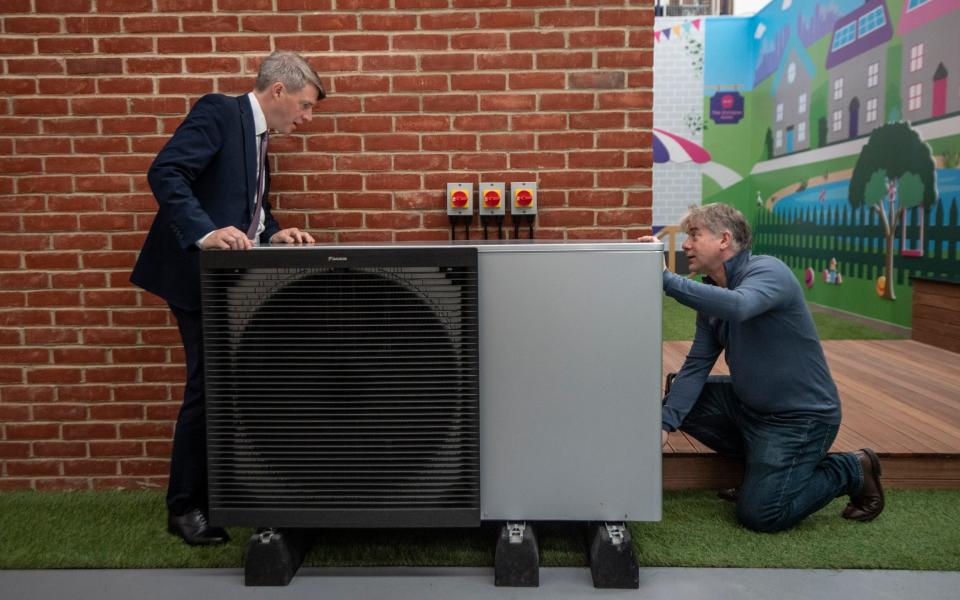Heat pumps won’t work in old homes, warns Bosch

Heat pumps will not work for Britain’s Victorian houses, one of the largest makers of the devices has warned.
Vonjy Rajakoba, managing director of Bosch UK, told The Telegraph that heat pumps did not make sense for older homes that lack extensive insulation or were not detached.
Mr Rajakoba said: “At low temperature you need well insulated homes, you also need space for heat pumps for the external unit and also the tank, so you need to have the sort of home which is adequate around the heat pumps.
“We think that in the UK, with the fleet of Victorian houses or period houses and so on, hydrogen, or in the interim hydrogen-ready boilers, are the solution.”
Mr Rajakoba’s comments will stoke doubts about the current government "net zero" strategy, given Britain’s ageing housing stock. Almost two fifths of private homes were built before 1945, according to government figures.
Mass adoption of heat pumps is a key plank of Britain's plan to reach “net zero” carbon emissions by 2050.
The electric devices raise the temperature in people's homes by pumping compressed air from outside to raise the temperature indoors. The Government wants to see 600,000 heat pumps installed each year by 2028, compared to around 35,000 today.
However, adoption has been slow so far, owing to the high cost of installing them and concerns about their suitability for certain homes.
Bosch makes both heat pumps and gas boilers for the UK market under its Worcester brand and is one of the country’s biggest suppliers of central heating, selling tens of thousands of units each year. Globally, the German company sold €4.5bn (£4bn) of heating products last year.
Mr Rajakoba said there was a market for both heat pumps and hydrogen-powered boilers but said hydrogen was the best current solution for older homes.
The UK gas network is currently being upgraded with plastic pipes to accept the gas and the Government wants new boilers to be capable of burning hydrogen from 2026.
However, a House of Lords committee claimed in February that using hydrogen to heat homes was “not a serious option”, citing concerns about whether the gas could be produced at scale and cheaply enough. The report urged the Government to instead focus solely on heat pumps.
Mr Rajakoba said: “Like any new industry we do not have the economy of scale. The hydrogen of today is expensive. But that gap is reducing.”
Supplying hydrogen-ready boilers, which can burn today’s methane as well as a mix of methane and hydrogen, would allow for an easy switch to greener fuel as hydrogen becomes available in sufficient quantities and at affordable prices, he said.
Hydrogen-fired boilers, which are similar in price to today’s methane-burning models, are also more affordable than heat pumps up front.
According to the Energy Saving Trust, a heat pump typically costs between £7,000 and £13,000 to buy and install.
Buyers can apply to the government’s boiler upgrade scheme, which offers discounts of £5,000 per home for heat pumps. However, the devices will still set a household back by £2,000 to £7,000 even with a £5,000 voucher.
By comparison, the cost of a new gas boiler can be as little as £570 plus installation fees, according to findings by website The Eco Experts.
Take up of the government scheme has so far been slow, according to official figures. Only 7,600 of the first 30,000 heat pump vouchers having been redeemed by the end of January, or just £38.4m of the first year’s £150m budget.
Like Bosch, gas industry chiefs are backing hydrogen as a long-term solution to heating homes. Industry representatives wrote a joint letter to the House of Lords committee that published February's report on hydrogen, arguing that heat pumps will be "unviable" for millions of low-income households, high-rise flat residents and those in small properties.
